Some people should never own dogs because they are unable to appreciate them and adore them like they deserve.
Sadly, many precious canines grow up in homes with owners who mistreat them and fail to provide them care and affection.
Benito and Lynch had the misfortune of living with an owner who didn’t care for their health and happiness, and who ended up neglecting them.
The two canines found comfort in each other and kept hoping that somebody would save them from their owner.
A Good Samaritan Calls For Help
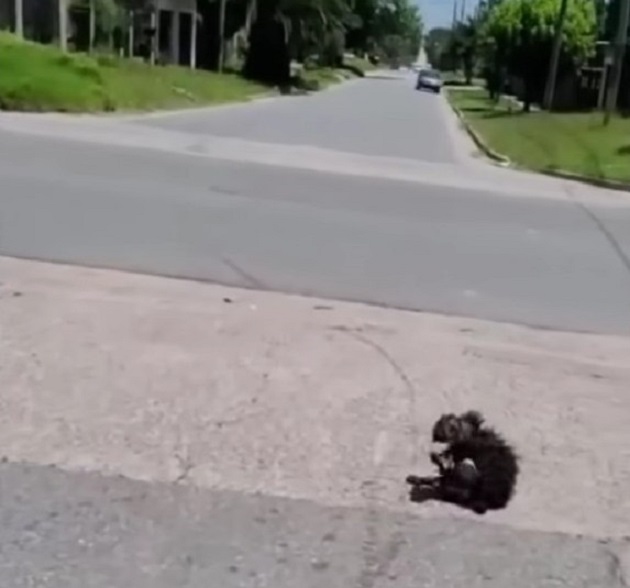
One day, a Good Samaritan contacted the founder of a local rescue, telling her that two dogs in their neighbourhood desperately needed help.
The rescuer instantly headed to the said address.
Upon her arrival at the neighbourhood, the rescuer saw one of the dogs that she was looking for. He was sitting on the road and scratching his itchy skin.
The rescuer slowly approached the pooch, petted him, and held his head in her hands. The dog, named Lynch, looked at her with tearful eyes, pleading for help.
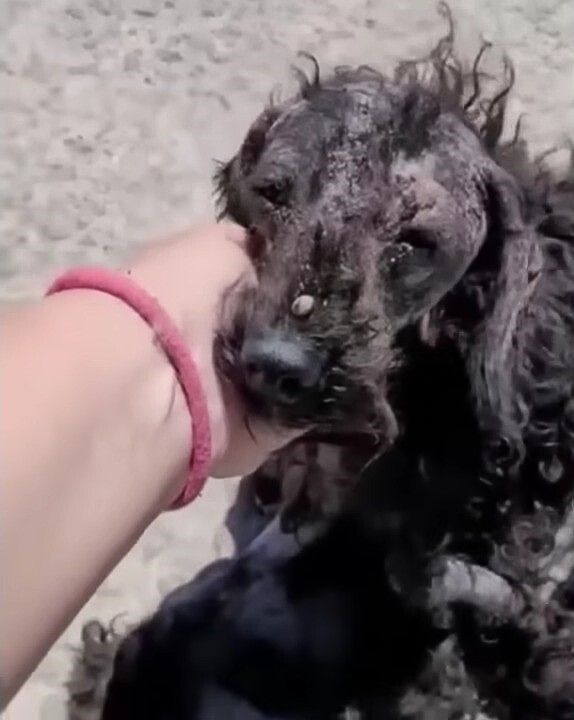
The woman’s heart became filled with sorrow.
Soon, she found Lynch’s brother, Benito. He was inside their owner’s house.
Benito was in an equally bad state as his brother. His severely matted fur was full of dirt and ticks.
The giant-hearted woman talked to the dogs’ owner. He allowed the rescuer to take the dogs with her in order to help them. The owner said that he wanted his canines back after they recovered.
The rescuer was shocked.
Since she didn’t want the doggos to return to their careless owner, the rescuer negotiated with him. After paying him the sum of money he asked for, the woman carried the pups to her car.
Benito was smiling as if he knew that he was saying goodbye to his painful past.
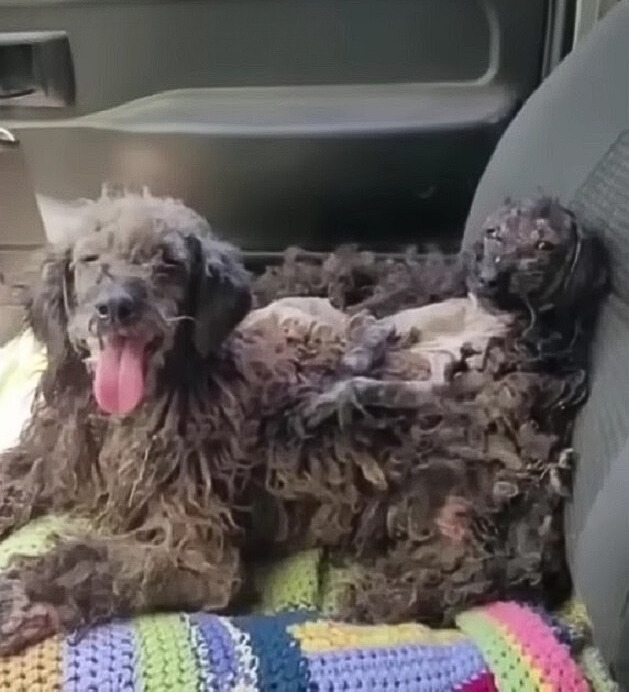
Lynch was lying in the car. He kept his sad gaze fixed on the rescuer. He and his brother were putting all their faith in her.
The kind woman drove them to her rescue. She gave them food, and the pups began eating quickly. They were starving.
The Canines’ Road To Recovery
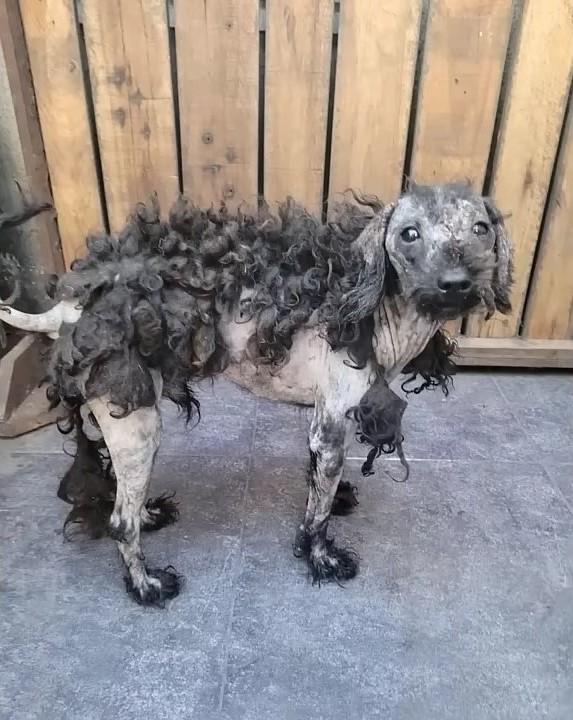
Lynch was only a year old. His body was infested with ticks and covered in wounds.
He began crying when his rescuer started taking care of him. She removed Lynch’s fur, and she bathed him.
Benito was five years older than his sibling. The rescuer noticed that there was something wrong with his leg. He was limping.
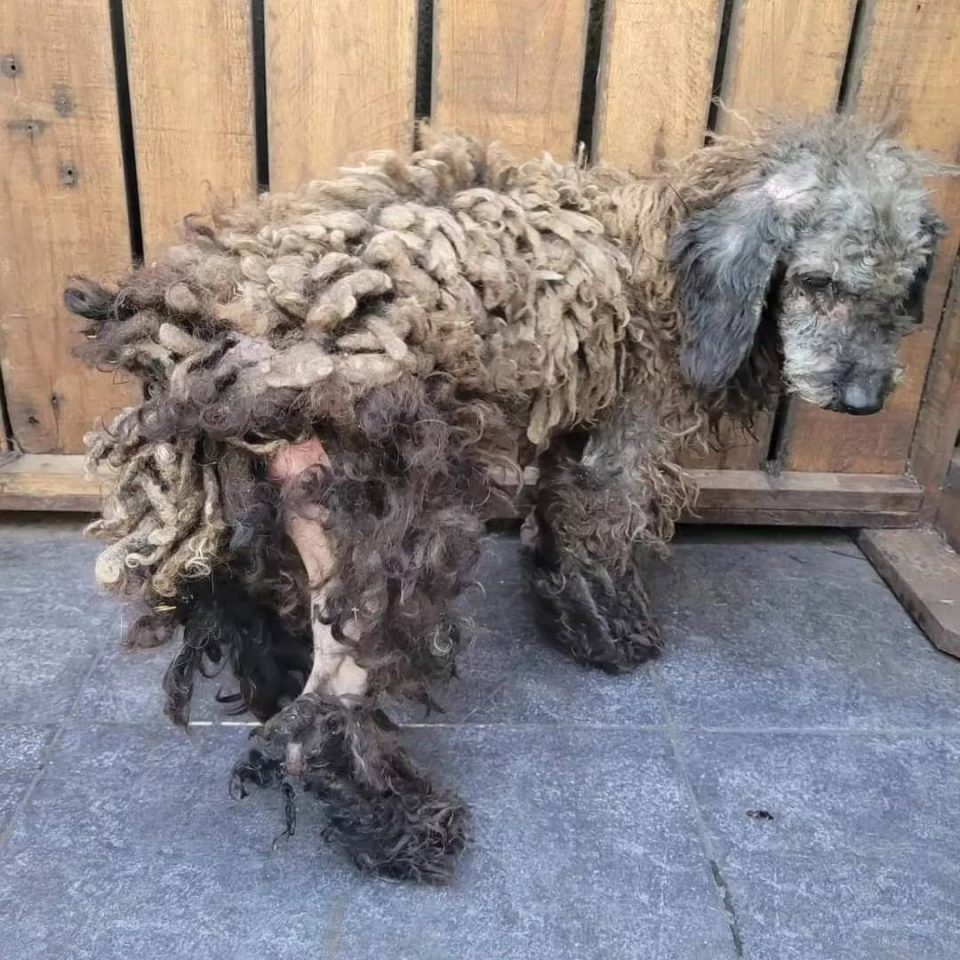
The rescue staff trimmed Benito’s fur that was causing him itching, and they gave him a much-needed bath.
The pooch was scared and he was shivering from fear.
His caregivers talked to him in a loving voice, telling him that everything would be alright.
They pampered the dogs with care, showering them with love and encouragement.
As time passed, the pups’ skin started healing. They looked much better.
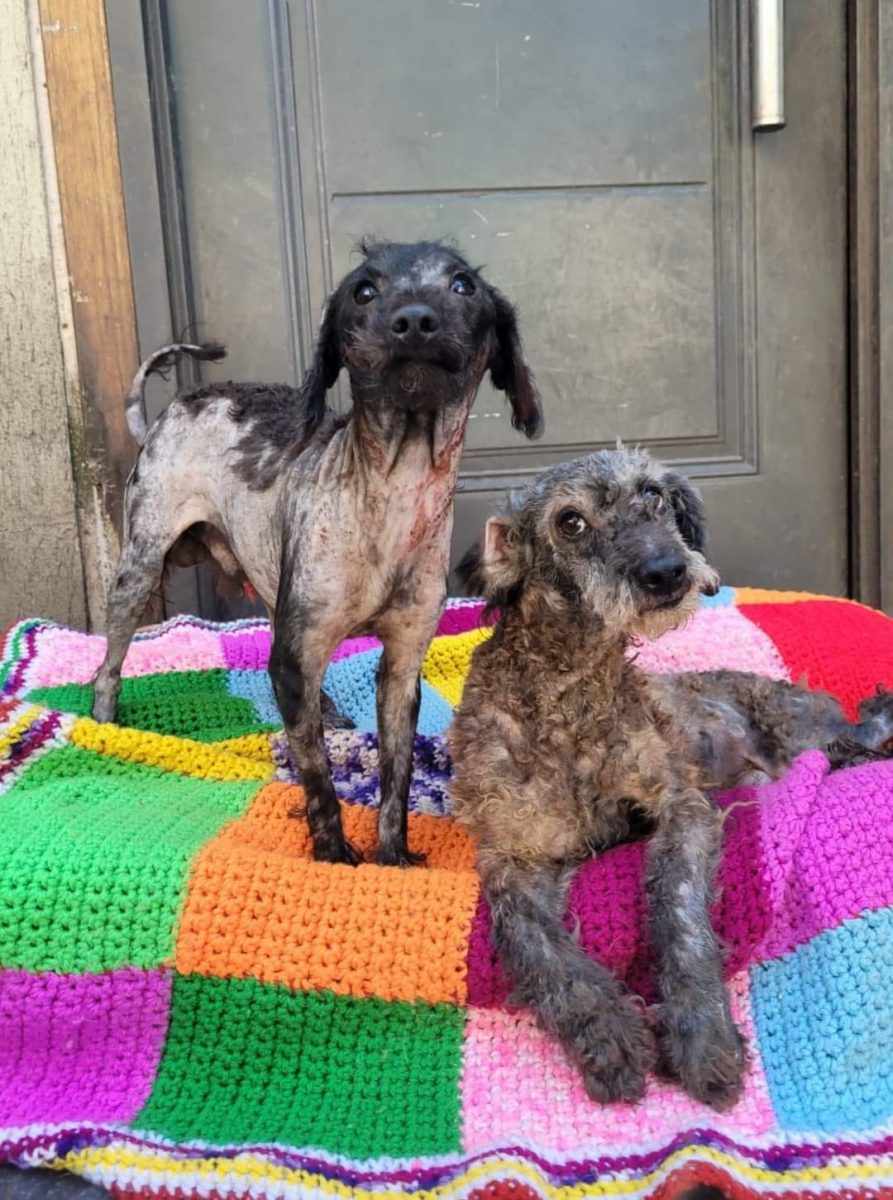
Benito and Lynch were each other’s biggest support. The two brothers spent a lot of time snuggling and playing with each other.
The dogs’ rescuer took Benito to a doctor for a thorough checkup of his leg. It turned out that the pup had pain in his joints. He was prescribed medicine that would help him.
The love that Benito and Lynch received at the rescue changed their lives. They made a full recovery. Their faces were now smiling and glowing with happiness.
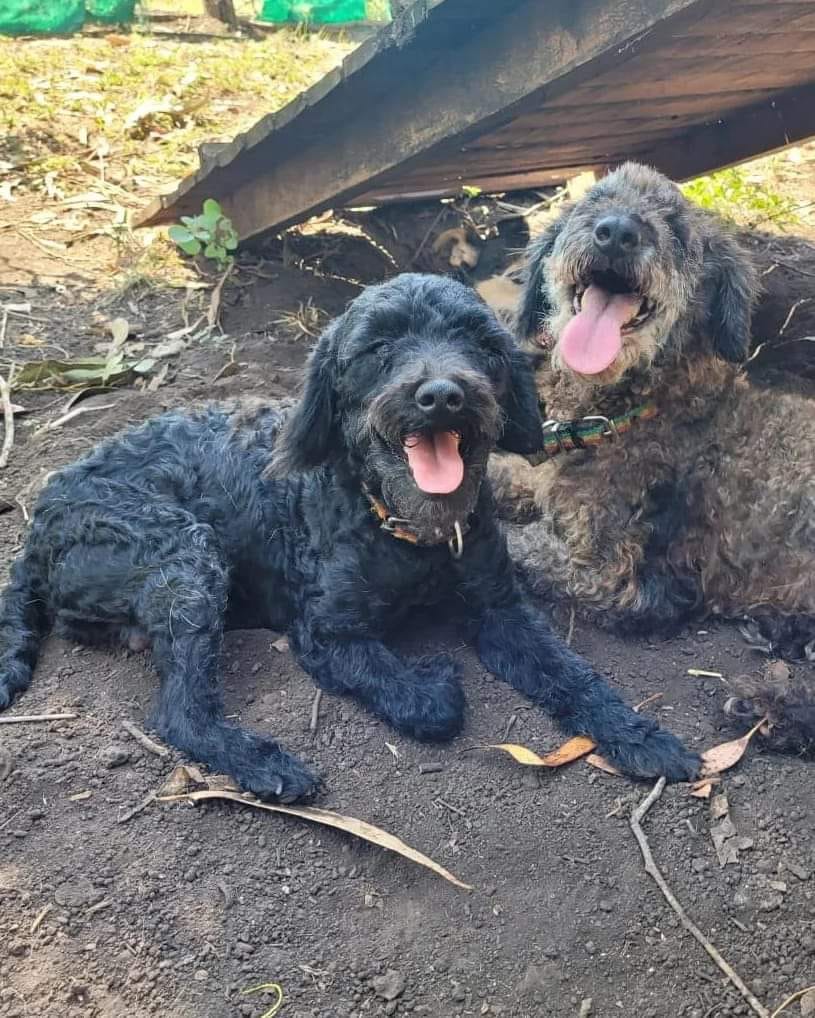
Benito and Lynch began looking for their forever homes, longing to have the life they always wished for.
We hope that these resilient pups will find parents who will treasure them and love them like they have always dreamed of.
If your furry friend is feeling under the weather with an upset stomach, knowing how to provide relief can make all the difference. As a seasoned dog enthusiast, you understand the importance of keeping your canine companion happy and healthy. When it comes to addressing stomach troubles in dogs, a few simple remedies can help ease their discomfort and get them back to their playful selves in no time.
Navigating the world of pet care can sometimes feel overwhelming, but understanding how to soothe your dog’s upset stomach is a valuable skill every pet owner should have. With a few practical tips and tricks up your sleeve, you can be prepared to handle these common health issues with confidence, ensuring your loyal companion receives the care they need when they need it most.
Understanding Upset Stomach in Dogs
If your furry friend is showing signs of an upset stomach, it’s essential to understand what could be causing this discomfort. Upset stomachs in dogs can occur due to various reasons like dietary indiscretion, eating trash, sudden diet changes, or even stress. These factors can lead to symptoms such as vomiting, diarrhea, or loss of appetite in your canine companion.
Upset stomachs are common in dogs and can be distressing for both you and your pet. It’s crucial to pay attention to your dog’s symptoms and consult your veterinarian if the issues persist. Sometimes, upset stomachs can be resolved with home remedies, but in severe cases, professional medical attention may be necessary.
To help your dog feel better when experiencing an upset stomach, you can try simple remedies like feeding them a bland diet of boiled chicken and rice to settle their stomach. Additionally, ensuring they have access to fresh water to stay hydrated is important during this time. It’s best to avoid giving your dog any medication without consulting your vet first.
By understanding the common causes of upset stomachs in dogs and knowing how to address them effectively, you can help your furry companion feel better sooner. Remember, your pet’s well-being is a top priority, so always seek professional advice if you’re unsure about how to manage your dog’s upset stomach.
Treating Upset Stomach in Dogs
When your dog has an upset stomach, it’s essential to know how to help them feel better quickly. Here are some simple yet effective ways to treat your dog’s upset stomach:
1. Fasting:
Give your dog’s stomach a break by fasting them for 12-24 hours. This helps calm their digestive system and gives it a chance to recover.
2. Offer Bland Food:
After fasting, gradually introduce a bland diet like boiled chicken and rice. This mild meal is gentle on your dog’s stomach and can help alleviate gastrointestinal distress.
3. Ensure Proper Hydration:
Encourage your dog to drink water regularly to prevent dehydration and aid in the recovery process. Dehydration can worsen stomach issues, so hydration is key.
4. Small, Frequent Meals:
Once your dog starts eating again, feed them small, frequent meals throughout the day instead of one large meal. This approach is easier on their stomach and helps prevent overloading.
5. Avoid Certain Foods:
During your dog’s recovery, avoid giving them fatty, spicy, or rich foods that can further upset their stomach. Stick to the bland diet until their stomach settles.
6. Monitor Symptoms:
Keep a close eye on your dog’s symptoms and behavior. If their upset stomach persists, or they show signs of lethargy, dehydration, or severe pain, consult your veterinarian promptly.
7. Probiotics:
In some cases, your vet may recommend giving your dog probiotics to help restore the balance of good bacteria in their digestive system. This can aid in improving gut health.
By following these straightforward tips, you can effectively manage your dog’s upset stomach and help them feel better soon. Remember, your furry friend’s well-being is a top priority, so don’t hesitate to seek professional advice if needed.
Diet Recommendations for Dogs with Upset Stomach
When your dog has an upset stomach, adjusting their diet can play a crucial role in helping them feel better. Here are some dietary recommendations to consider for your furry friend:
1. Bland Food Choices:
Stick to bland options like boiled chicken and white rice. These are easy on your dog’s stomach and can help in easing digestive discomfort.
2. Low-Fat Diet:
Opt for low-fat foods. High-fat foods can be harder for your dog to digest, so choosing low-fat alternatives can be gentler on their upset stomach.
3. Small, Frequent Meals:
Offer small, frequent meals throughout the day. This can prevent your dog’s stomach from getting overloaded and help in better digestion.
4. Avoid Certain Foods:
Avoid giving your dog spicy, greasy, or rich foods. These can further irritate their stomach and worsen the situation.
5. Probiotics:
Consider incorporating probiotics into your dog’s diet. Probiotics can help in restoring the balance of good bacteria in your dog’s gut, aiding in digestion.
6. Hydration:
Ensure your dog stays hydrated. Offer plenty of fresh water to prevent dehydration, especially if they have been experiencing vomiting or diarrhea.
By following these diet recommendations, you can provide the needed care for your dog’s upset stomach and support their recovery. Remember to monitor their symptoms closely and consult your veterinarian if the issues persist for proper guidance. Your furry friend’s well-being is important, and taking care of their stomach health is a step towards ensuring their overall happiness.
Prevention Tips for Future Upset Stomach Incidents
To prevent future upset stomach incidents in your furry companion, follow these helpful tips:
- Monitor Food Intake: Keep an eye on what your dog consumes. Avoid fatty, spicy, and human foods as they can trigger stomach upsets.
- Stick to a Balanced Diet: Provide your dog with a balanced and consistent diet to promote digestive health. Opt for high-quality dog food that meets their nutritional needs.
- Hydration is Key: Make sure your dog has access to fresh water at all times. Dehydration can worsen stomach issues, so encourage regular water intake.
- Regular Exercise: Engage your dog in regular physical activity to maintain their overall health. Exercise aids digestion and can prevent stomach upsets.
- Stress Management: Dogs can experience stomach upsets due to stress or anxiety. Create a calming environment for your pet and address any behavioral issues promptly.
- Probiotics: Consider incorporating probiotics into your dog’s diet to promote gut health. Consult with your vet to choose the right probiotic supplement for your furry friend.
- Routine Veterinary Check-ups: Regular vet visits can help detect and address potential health issues early on. Keep up with vaccinations and preventive care to ensure your dog’s well-being.
By implementing these prevention tips, you can help reduce the occurrence of upset stomach incidents in your dog and keep them happy and healthy. Remember, always consult your vet for personalized advice based on your dog’s individual needs.
Conclusion
Remember, taking care of your furry friend’s upset stomach involves simple steps like fasting, offering bland food, and ensuring they stay hydrated. Prevention is key, so keep an eye on their diet, provide balanced meals, and incorporate probiotics. Regular vet check-ups are crucial for tailored advice. By following these tips, you can help your dog maintain a healthy digestive system and lead a happy, comfortable life.
Frequently Asked Questions
What are some practical tips to address my dog’s upset stomach?
To address your dog’s upset stomach, you can try fasting for 12-24 hours, then gradually introduce bland food like boiled chicken and rice. Ensure your dog stays hydrated with fresh water and monitor symptoms closely for improvement or worsening.
How can I prevent future stomach upsets in my dog?
To prevent future stomach upsets, monitor your dog’s food intake, provide a balanced diet, ensure proper hydration, engage in regular exercise, manage stress levels, introduce probiotics, and schedule routine vet check-ups. These measures help maintain digestive health and overall well-being. Consult your vet for personalized guidance tailored to your dog’s specific needs.
[no_toc]

Hey there, I’m Janet Brooks, a dog-loving student from California. I’m all about helping pups in need, especially those without homes. Me and my awesome friends work together to give shelter and love to stray dogs. Oh, and I also write blogs about dogs to share helpful info.